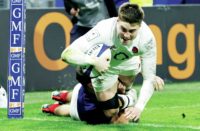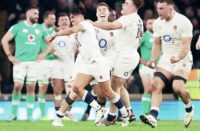 This may sound odd, but the loss of captain Chris Robshaw for the final Test may have been something of a blessing for the immediate future of English rugby despite the fact that he is one of the hardest working players in the current squad.
This may sound odd, but the loss of captain Chris Robshaw for the final Test may have been something of a blessing for the immediate future of English rugby despite the fact that he is one of the hardest working players in the current squad.
He has been at the heart of all that England have tried to achieve since being selected by Lancaster and may be because, rather than despite, not being included in England's last World Cup outing, he has shone in the role of new captain – but that can have a consequence.
For a relatively new group of players attempting to define themselves and a playing style, the cult of captain can often be an unwelcome distraction that can cause friction within the squad.
All too often there is a penchant by the media to place an undue focus on one player as the sole reason for success or failure of the team and, although there maybe some circumstances where the team are reliant on the specialist skills of a particular player or group of players in order to secure a win, this is surely a basic requirement in all team sports.
There are specialist requirements for each position otherwise there wouldn't be a need for players with different physical and mental attributes and you could interchange all players without requiring specialists on the substitute's bench.
From an old rugby forward's perspective it always seemed to me that the media highlights the actions of one or two of the backs who are seen as the golden boys that score all, or most of, the points whether as try scorers or goal kickers and yet often it is the sterling work of others that create those scoring opportunities.
When I played it was Rob Andrew (goal kicker) and Rory Underwood (England's leading try scorer) along with Captain Will Carling who were lionized by the Press although Andrew and Underwood would readily admit that they were doing the job they were chosen for within the team.
Then, as now, front five forwards and inside backs are those that create the space and opportunity that can be exploited to score a try, while generally it is the pressure that the forwards put their
opposition under that forces them into conceding penalties whether at the set piece or in open play.
The role of the captain is now very different from other players in the modern game as he is the public face of the team and even though there is this historic idea that any group of men or women competing in any team activity need a captain to lead them, that is less true today than in the past.
In years gone by the captain was the embodiment of the coach on the field, he was the man that the coach believed could interpret what had been achieved on the training field into the performance by the team during the game, making any necessary adjustments to the overall game plan as the coach had little or no contact with his team once the game had kicked off.
Now with radio linked water carriers and instant computer analysis of tactical team play allowing the coach a virtually constant contact with a number of key players (leaders) for each area of play, the coaching team are able to make on field decision.
As a result, the role of a captain at international level has slowly diminished to little more than a figurehead.
That is not to say there haven't been inspirational captains during recent times. On the contrary, players like Martin Johnson, Nigel Melville, Gavin Hastings, Sam Warburton, Richie McCaw and even, dare I say, Will Carling have all helped drive their teams to victory. That said, each of those teams had a number of other inspiring characters who also contributed to their success.
Would Wales be this year's Six Nations champions were it not for the inspirational play of among others George North, Leigh Halfpenny, Rhys Priestland, Mike Phillips, Gethin Jenkins and Adam Jones?
England's World Cup win would not have been achieved without Jonny Wilkinson, Will Greenwood, Josh Lewsey, Jason Robinson, Lawrence Dallaglio, Neil Back, Richard Hill, Jason Leonard, SteveThompson and the rest.
I must admit to a little amusement at the comment that Dylan Hartley had been chosen as replacement captain in part because of his leadership in the dressing room, although I am sure he will serve his adopted country well.
Any player will tell you that all players are different and the way that they prepare for a match is also different.
Some like to make a lot of noise and encourage their team mates in a very visual display that can be interpreted as motivational but, in reality, that player is trying to motivate himself rather than the rest of the team.
Others, while sitting quietly thinking their own thoughts as they prepare for the challenges ahead, may be seen as introvert but can be just as, if not more, inspirational for the team once the game starts.
In my time I played under six England captains and I know that the actions on the field by the likes of Wade Dooley, Peter Winterbottom, Mike Teague, Jerry Guscott and Rory Underwood were far more inspirational than any words either in the dressing room or in a huddle – whether from a captain or not!


























